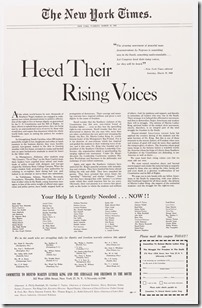Archive
Heed Their Rising Voices
While I gather my thoughts and feelings about the live issue of free speech and suits for defamation, another case relating to free speech, the media and a suit for libel came to mind.
Fifty years ago this month, the US Supreme Court heard the cases of New York Times v. Sullivan and Abernathy v. Sullivan. On 29 March, 1960 The New York Times published a full-page advertisement from the Committee to Defend Martin Luther King. It included the names of twenty religious ministers working in the south in the civil rights campaign.
The Montgomery Police Public Safety Commissioner L. B. Sullivan sued both The New York Times and four of the ministers named, Ralph Abernathy, S. S. Seay, Fred Shuttlesworth and Joseph Lowery, for $500,000, based on inaccuracies in the text of the ad. For example, the ad stated that King had been arrested seven times, when in fact he had been arrested four times. The Alabama trial court and supreme court both found in favour of Sullivan, and awarded him the full sum of money. This led to similar suits, which would have hurt both the civil rights movement and the possibility of press coverage of abuses in southern states quite severely. It was widely believed that this was the ultimate aim; not the award of money to Sullivan and others, but to ensure that they could continue to act without scrutiny.
Noël Browne speaking on Seanad abolition, November 1957
On 20 November 1957, Independent TD Dr Noël Browne proposed a Private Members’ Motion, “That Dáil Éireann is of the opinion that Seanad Éireann as it is at present constituted should be abolished.” The motion was seconded by Independent TD Jack McQuillan (Browne and McQuillan were to found the National Progressive Democrats in 1958).
Browne continued on 27 November. On 4 December, Taoiseach Éamon de Valera instead proposed a commission to examine the method of election for senators, and Noël Browne reluctantly accepted this compromise, saying “we shall accept that position as making the best of a bad job and wish the committee to be established every success”. (Credit to John O’Dowd of UCD’s School of Law for initially pointing me towards de Valera’s response)
Browne did serve as a Senator for the University of Dublin from 1973 to 1977, as many do between time in the Dáil when they lose their seat, but bar taking account for inflation, much of his 1957 speech stands as true in today’s debate. I have reproduced this speech in full.
I move:—
That Dáil Éireann is of the opinion that Seanad Éireann as it is at present constituted should be abolished.
In moving this motion it is necessary to go over some of the history associated with the formation of the Seanad and its subsequent career. This is the second time that a motion of this nature was moved in this House. On the previous occasion, however, the motion simply asked for the abolition of the Seanad as it stood. It was moved by the present Taoiseach, Deputy de Valera, and behind him he had the backing of an effective majority, with which, there was no doubt, he intended to implement his will.
I do not intend to go into the reasons why the then Taoiseach, Deputy de Valera, insisted on the removal or abolition of the Seanad but I shall draw to a very considerable extent on many of the very cogent, telling and compelling arguments which he used at that time in order to try to persuade the House to agree that a Seanad as such or, indeed, any Second Chamber at all was neither desirable nor necessary in a democratic society. As two Independents, it is quite clear that we cannot depend on the great overwhelming majority of a Party. Possibly because of that it should be possible to get a more reasoned argument from both sides of the House, to have the motion considered in a non-Party way, and, if possible, allow the Deputies to express their viewpoint independent of the Party Whip.
To those who feel that the Seanad is serving a useful purpose as it is and do not want to have it changed, I would very much like if they would put forward their arguments and try to justify their belief. I should not like to treat the House in the positively boisterous way in which the Taoiseach, Deputy de Valera, treated it away back in 1934, when he put the onus entirely upon the Opposition to prove that the Seanad was required. He said in Volume 52, column 1809, of the Dáil Debates:—
Irish rogues
I had a letter published in this week’s edition of The Economist, clarifying a side comment in their article on the visit of the Queen Elizabeth to Ireland.
SIR – You said that unlike Elizabeth II, Henry II did not receive an invitation to Ireland (“Irish, and British, eyes are smiling”, May 21st). This is not quite accurate.
The Norman invasion of Ireland was instigated at the invitation of Diarmaid Mac Murchada, King of Leinster, who was dispossessed of land by the High King of Ireland, Ruaidhri Ó Conchobair. Diarmaid met Henry II in Aquitaine in 1166. Henry agreed to send a force led by Richard de Clare, Earl of Pembroke (nicknamed Strongbow), who was married to Aoife, Diarmaid’s daughter. They arrived in 1169, and when a dispute arose over the succession to Leinster on Diarmaid’s death in 1171, Henry II claimed fealty of the entire island of Ireland.
Naturally, this invitation from Diarmaid for foreign assistance started centuries of English involvement in Ireland, and it has earned Diarmaid a place of infamy in the gallery of rogues of Irish history.
William Quill
Bray, County Wicklow
